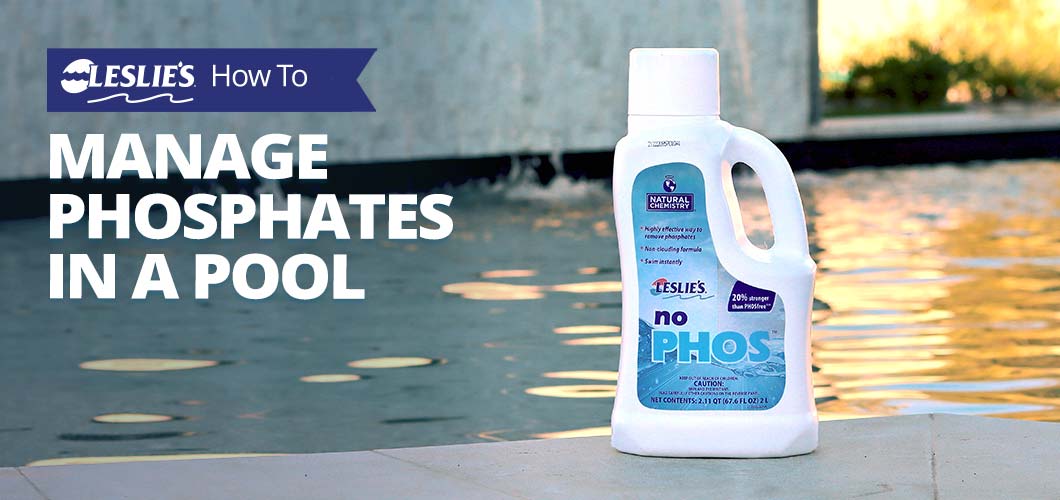
How to Manage Phosphates in a Pool
Organic contaminants can be one of the most frustrating things for pool owners to deal with. Some of the most notorious organic contaminants are phosphates. These microscopic chemical compounds can lead to gigantic pool issues, so knowing how to manage phosphates in your pool is vital. In this post, we will discuss how phosphates end up in your pool, and how to get rid of them to keep your pool clean and healthy.
What are Phosphates?
Phosphates are chemical compounds made of oxygen and phosphorous molecules, and provide essential nutrients for plants. These compounds live in nearly every organism on earth, including humans, animals, and plants. In humans and animals, phosphates maintain healthy teeth, bones, and heart functions. Many household gardening products, like fertilizers and soils, contain phosphates to encourage plant growth.
If you're thinking, "Phosphates don't sound so bad!", you're not wrong. Phosphates are very beneficial compounds, and they play a big role in keeping our ecosystem up and running. But when it comes to their presence in your pool, too much of a good thing can be bad.
How Do Phosphates Get into Your Pool?
Phosphates are not only found naturally in animals and plants, but they are frequently artificially added to cosmetic products, cleaning supplies, and like mentioned above, gardening materials. Sunscreen, laundry detergent, and even some pool chemicals contain phosphates. This makes it challenging to control your pool's exposure to them.
Are Phosphates Bad for Your Pool?

So the real question is, why are phosphates bad for your pool? Well, on their own, they're not harmful to your pool. But because they contribute to algae development, their presence puts your pool at risk. The quantity of phosphates in your pool dictates how much algae can grow. Meaning, the more phosphates present, the larger and more severe the potential algae bloom can be.
However, an elevated phosphate level in your pool does not automatically mean you will soon be dealing with an algae takeover. Properly balanced and sanitized water is always the first step in safeguarding your pool from most problems, including algae. If your pool begins to resemble a murky swamp, it's likely not just the phosphates' fault. Inadequate sanitizer levels and poor water chemistry regulation are the main causes for algae growth. But, managing the phosphate level is one of the best ways to ensure that your pool stays healthy, clean, and algae free. And thankfully, it is a simple process to eliminate phosphates and prevent them from getting out of control.
How to Manage Phosphates in Your Pool
The tried and true way to eliminate phosphates from your pool is to use Leslie's NoPHOS phosphate remover. But before starting any treatment, use a test kit or test strips to determine the phosphate level in your pool. Ideally, the level shouldn't be higher than 100 ppb (parts per billion). Anything greater than this significantly increases the risk of algae development — especially once levels reach 300 ppb or higher.
After the water chemistry test, give the bottle of Leslie's NoPHOS a good shake to mix the ingredients, then add approximately 4–6 ounces to your pool's skimmer. NoPHOS forms a film around the media in your pool filter and eliminates the phosphates as they travel through. An added benefit of NoPHOS is that you can swim immediately after adding it, and it has no effect on other pool water chemicals!
Phosphate Prevention
Once you get the phosphates below 100 ppb, use Leslie's Perfect Weekly to maintain the proper level. In addition to using Perfect Weekly, regularly skim or manually vacuum your pool to remove any plant debris from the water. And of course, test the water chemistry weekly to stay ahead of any potentially disastrous water problems!
Properly managing the phosphate content in your pool is fast and simple, and can save you a big, algae-filled headache. Sticking to a weekly cleaning and maintenance routine will keep you a step ahead of any phosphate issues. Stop by your local Leslie's to speak with one of our pool experts, or bring in a pool water sample for a free, in-store AccuBlue® water test and phosphate analysis!